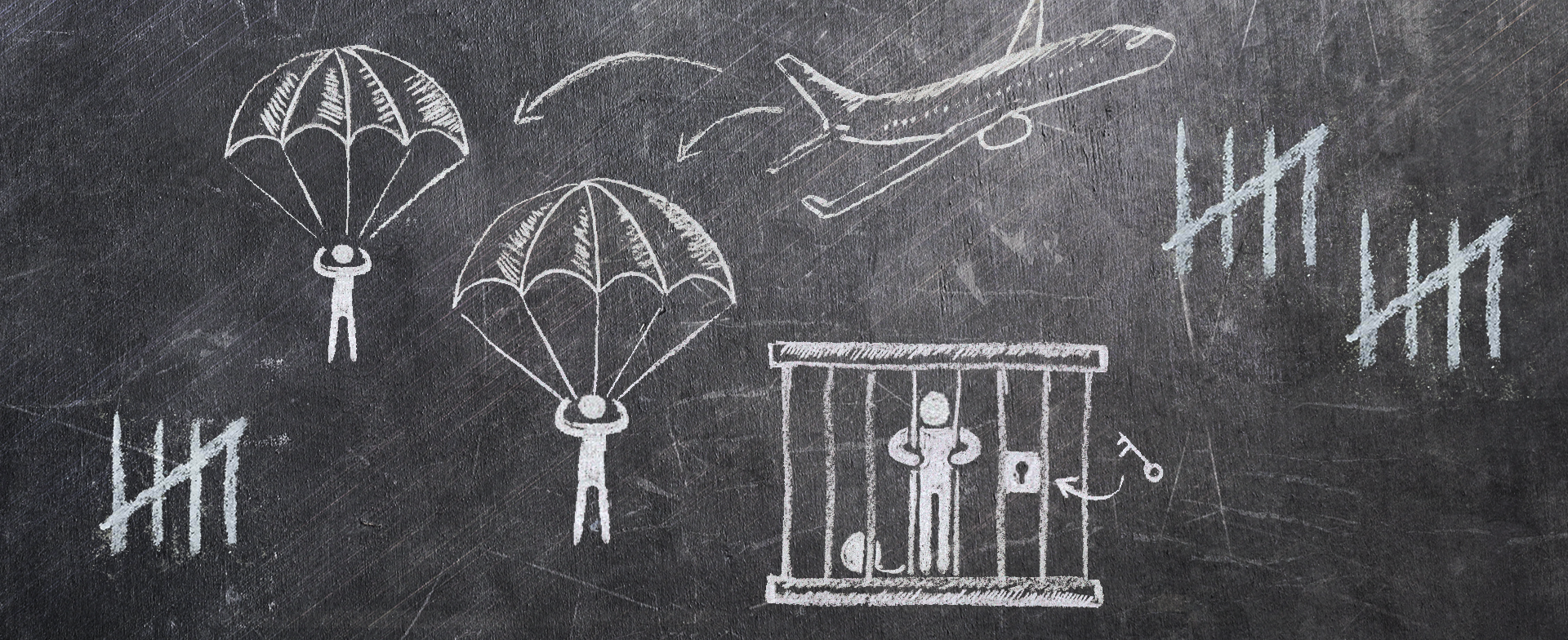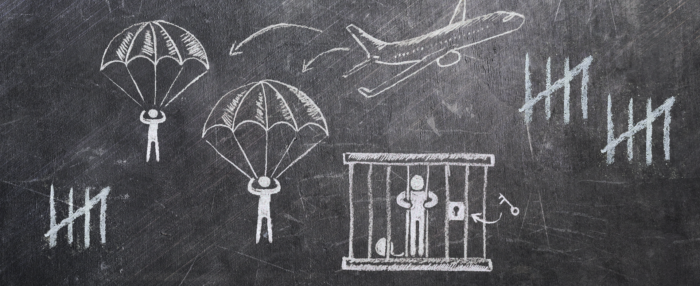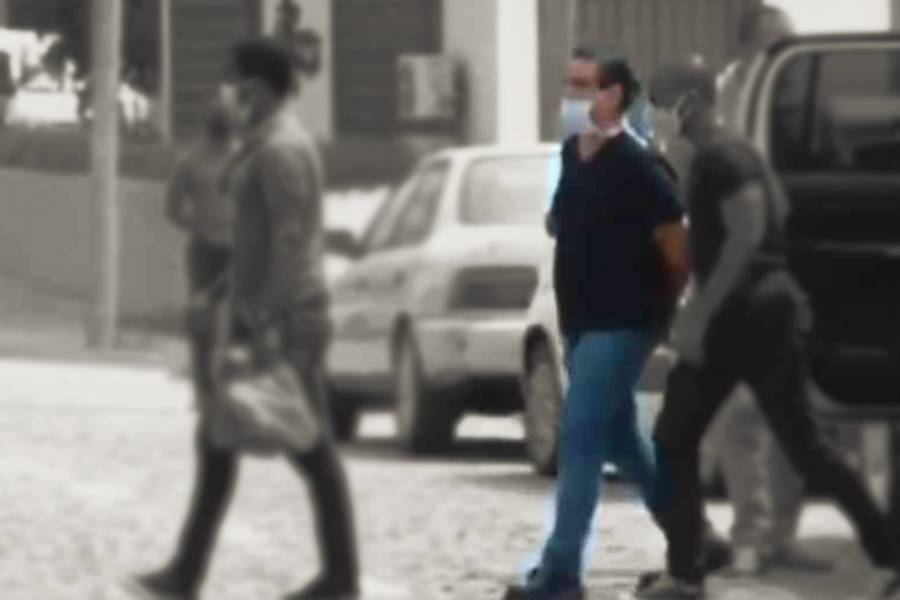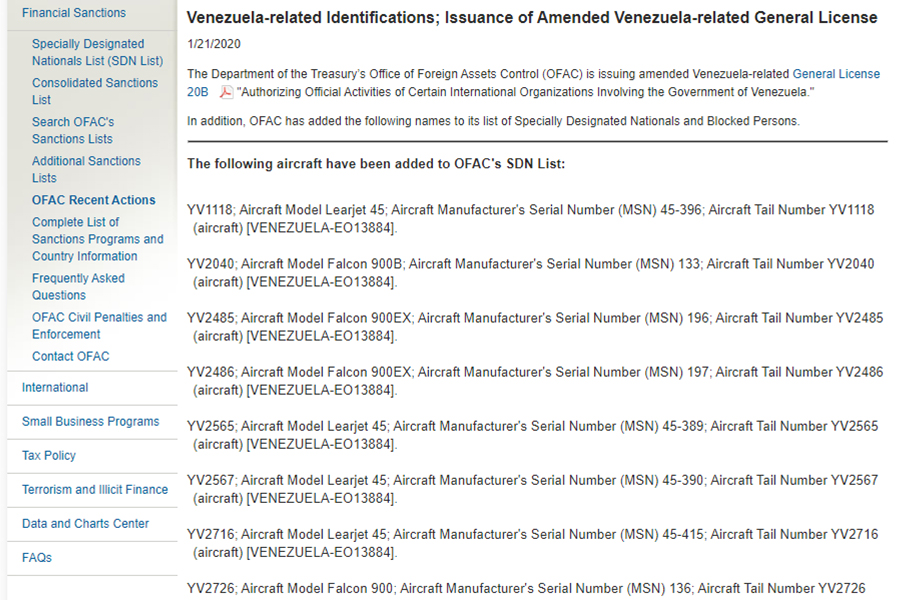

A Venezuelan executive jet, listed as suspicious by the United States, landing in a remote African capital… A group of passengers that includes special operations agents and stay in a military barracks… A mysterious Russian transport plane… A ship anchored by a paradise island… These are the wicks used in recent days to woven a web that is at par with a spy series. The mission was to assess the likelihood of rescuing Colombian businessman and alleged front man for Nicolas Maduro from his imprisonment in the neighboring Cape Verde archipelago, before his extradition to the United States. This happened just a month after his arrest.
|
Getting your Trinity Audio player ready...
|
The details of a four-day stopover in Bissau, June 26-30, of a Dassault Falcon 900EX of PDVSA, Venezuela’s state oil company, seem extraordinary, both for what happened and what might have happened.
Although it has not been possible to confirm the official story with the governments of Caracas and Bissau, sources contacted this week in a collaborative report between the Expresso newspaper from Lisbon and Armando.info gave versions that allow outlining the unusual reasons for the aircraft’s flight from the Caribbean to West Africa.
Sending the plane to Bissau, the capital of Guinea-Bissau, was part of a desperate attempt by Nicolas Maduro to learn about the situation of Alex Saab - his alleged front man and confirmed trader - in the neighboring Cape Verde archipelago, where he has been held since June 12, after his arrest by Interpol, and to assess a possible rescue.
Both Cape Verde and Guinea-Bissau are Portuguese-speaking nations in West Africa, former colonies of the Iberian country.
Saab and his partner, fellow Colombian Alvaro Pulido Vargas, are facing money-laundering charges in the federal court of the Southern District of the State of Florida, made in July 2019. The United States requested an Interpol red notice to be issued because of this accusation, which led to Saab’s arrest as soon as he landed at the Amilcar Cabral International Airport on Sal, one of Cape Verde’s islands. Now, Washington is requesting his extradition through a legal process that could stretch out for up to 65 days before a decision is made.Saab and Pulido Vargas ―the latter, allegedly hiding in Caracas - were sanctioned by the U.S. Department of Justice in the summer of 2019 for profiting from corruption in the business of the so-called Clap boxes, and it is not ruled out that they could be prosecuted in other U.S. jurisdictions for their participation in that business and in the illegal trade of Venezuelan gold to countries like Turkey. In Colombia, there is an arrest warrant for Saab. In Mexico, the authorities of the Financial Intelligence Unit have announced an investigation into the web of complicity that the Colombian business duo weave in that country in the development of the food supply business for the CLAPs. While it is known that the justice system of UK is also showing an interest in them.

However, the major trophy for the Western intelligence services is not the eventual prosecution of Saab, but the information he certainly has on how Maduro’s inner circle and businesses work. His testimony could help decode the scheme that still oxygenates the finances of pro-Chavez leaders and give them a lethal blow. That is why the Venezuelan government is also moving with unusual urgency and emphasis to free Saab from his imprisonment and bring him back to Caracas, something that has become a priority for Chavismo.
In a first official reaction, Venezuelan Foreign Minister Jorge Arreaza affirmed in a statement that Saab was on a humanitarian and commercial mission as an “agent of the Bolivarian Government” for which he had a diplomatic passport and immunity. He then sent two letters to the president of Cape Verde, Jorge Carlos Fonseca. The African leader admitted in recent days, in a declaration of calculated naivety, that he did not remember ever having received so many calls from foreign governments as it happened since the arrest of Alex Saab, and described the case as “sensitive” for the justice system of his country because of the interests involved. But while that was happening in the formal channels of diplomacy, Caracas began to make other arrangements. The flight of PDVSA’s airplane YV2486 was part of those arrangements. In January of the current year, the plane was included in the sanctions list of OFAC, of the U.S. Department of the Treasury, as one of the aircraft on which Chavista leaders travel. Its route through the Cape Verde archipelago appeared on flight tracking websites and sparked rumors on social media.

On June 26, PDVSA’s Falcon landed at Osvaldo Vieira International Airport in Bissau, in African land, about 1200 km (746 mi) from the prison of Saint Vincent, the island of Cape Verde to which Saab was transferred after his arrest on the island of Sal. According to sources linked to local authorities, the flight crew and the passengers did not go through immigration or to the city. Hence, they were not identified.
During their stay in Bissau, from June 26 to at least June 30, the occupants of the plane stayed in a military facility, on the north side of the airport. The information states that the group included special operations agents.
Before landing in Bissau, the plane had been in Cuba for several days. Sources contacted by Armando.info said that the presence of Cuban intelligence agents among the passengers on that flight possibly indicates that the group’s mission was to assess the potential rescue of Saab. According to this version, the flight also carried valuables to pay bribes.
Another source in Caracas has a different version. The aircraft was carrying a group of ambassadors and diplomatic personnel, including a special envoy from Maduro. If that were the case, it is difficult to understand why the passengers were confined to military facilities at Bissau’s Osvaldo Vieira airport for four days, instead of making arrangements directly in Cape Verde.
After its long journey, the PDVSA plane with registration number YV2486 finally returned to Maiquetia International Airport from Senegal, on July 5, coincidentally, the day of the independence of Venezuela and Cape Verde.
The sources in Guinea-Bissau contacted by Expresso said that the PDVSA executive jet was joined by another aircraft on the mission. It was an Airbus A330-323X with Russian registration that had been parked for two weeks at the airport in the Guinean capital. A ship that was anchored near Soga―one of the islands of the Bijagós archipelago in the south of the country―was also part of the operation.
Although registered under the name of I-Fly, a small Russian airline founded in 2009 with a fleet of nine airplanes, the twin-engine Airbus A330 had been recently acquired by Turkish investors, but this could not be confirmed. Its crew and passengers were also not identified by Immigration officials at Osvaldo Vieira Airport. On July 7, the plane flew from Bissau to Caracas and from there, just two days later, to Moscow. Then, two days later, it flew to China and landed in the now renowned city of Wuhan, where the Covid-19 pandemic began earlier this year.
A source affirmed to Armando.info that Mike Pompeo, the U.S. Secretary of State, spoke directly with the Prime Minister of Cape Verde, Ulisses Correia e Silva, to inform him of the movements of the Venezuelan jet and offer him military equipment to reinforce the surveillance of the Saint Vincent prison. The journalist for Expresso learned that special force commandos were sent to that island to prevent a possible escape. Finally, Saab was again moved to Sal Island. While Saab’s extradition process continues to be in the hands of a local court, sources in Cape Verde assume that the ruling is likely to favor U.S.’s request.
Meanwhile, in Guinea-Bissau, neither President Umaro Sissoco Embaló nor spokespersons of his Government have taken a position on the issue. However, Expresso learned that the head of state personally called a local journalist who had published some articles on the matter in the international press, and threatened him, “Be careful. My information services are monitoring you. They told me that you are investigating the Russian and Venezuelan airplane issue.”
Several international organizations consider the political situation in Guinea-Bissau very sensitive. So far, Embaló has not given in to the request of the Economic Community of West African States (ECOWAS) to form by May 22 - more than a month ago - a new government that respects the result of the 2019 parliamentary elections, in which the opposition party PAIGC (African Party for the Independence of Guinea and Cape Verde) ―a movement of Marxist-Moscow origin founded in 1956 by the legendary Cape Verdean leader Amilcar Cabral― was victorious.
On this Sunday, July 12, it would be a month since Alex Saab was detained in faraway Cape Verde, where the plane that was taking him to Iran to continue his business with Chavism landed on a technical stopover, which now seems to have no end.
* This report is the result of a joint coverage between the ‘Expresso’ newspaper from Lisbon and Armando.info in Caracas and Bogota.
When Vice President Delcy Rodríguez turned to a group of Mexican friends and partners to lessen the new electricity emergency in Venezuela, she laid the foundation stone of a shortcut through which Chavismo and its commercial allies have dodged the sanctions imposed by Washington on PDVSA’s exports of crude oil. Since then, with Alex Saab, Joaquín Leal and Alessandro Bazzoni as key figures, the circuit has spread to some thirty countries to trade other Venezuelan commodities. This is part of the revelations of this joint investigative series between the newspaper El País and Armando.info, developed from a leak of thousands of documents.
Leaked documents on Libre Abordo and the rest of the shady network that Joaquín Leal managed from Mexico, with tentacles reaching 30 countries, ―aimed to trade PDVSA crude oil and other raw materials that the Caracas regime needed to place in international markets in spite of the sanctions― show that the businessman claimed to have the approval of the Mexican government and supplies from Segalmex, an official entity. Beyond this smoking gun, there is evidence that Leal had privileged access to the vice foreign minister for Latin America and the Caribbean, Maximiliano Reyes.
The business structure that Alex Saab had registered in Turkey—revealed in 2018 in an article by Armando.info—was merely a false start for his plans to export Venezuelan coal. Almost simultaneously, the Colombian merchant made contact with his Mexican counterpart, Joaquín Leal, to plot a network that would not only market crude oil from Venezuelan state oil company PDVSA, as part of a maneuver to bypass the sanctions imposed by Washington, but would also take charge of a scheme to export coal from the mines of Zulia, in western Venezuela. The dirty play allowed that thousands of tons, valued in millions of dollars, ended up in ports in Mexico and Central America.
As part of their business network based in Mexico, with one foot in Dubai, the two traders devised a way to replace the operation of the large international credit card franchises if they were to abandon the Venezuelan market because of Washington’s sanctions. The developed electronic payment system, “Paquete Alcance,” aimed to get hundreds of millions of dollars in remittances sent by expatriates and use them to finance purchases at CLAP stores.
Scions of different lineages of tycoons in Venezuela, Francisco D’Agostino and Eduardo Cisneros are non-blood relatives. They were also partners for a short time in Elemento Oil & Gas Ltd, a Malta-based company, over which the young Cisneros eventually took full ownership. Elemento was a protagonist in the secret network of Venezuelan crude oil marketing that Joaquín Leal activated from Mexico. However, when it came to imposing sanctions, Washington penalized D’Agostino only… Why?
Through a company registered in Mexico – Consorcio Panamericano de Exportación – with no known trajectory or experience, Joaquín Leal made a daring proposal to the Venezuelan Guyana Corporation to “reactivate” the aluminum industry, paralyzed after March 2019 blackout. The business proposed to pay the power supply of state-owned companies in exchange for payment-in-kind with the metal.